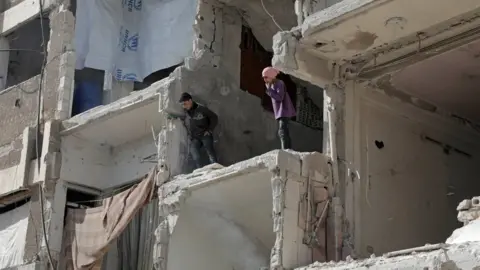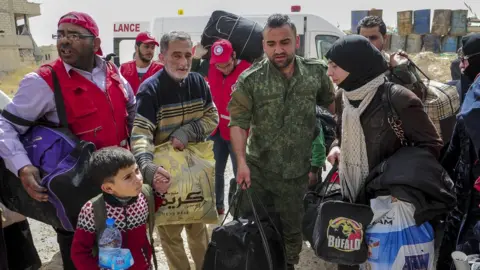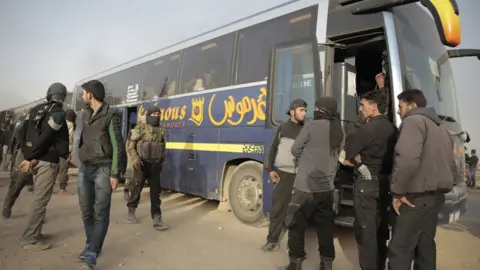Syria war: Troops mass around last rebel town in Eastern Ghouta
 AFP
AFPSyrian government forces have massed around the last rebel-held town in the Eastern Ghouta area, after rebels were reportedly given a deadline to leave.
A newspaper said troops were preparing for a "huge" operation in Douma, which is controlled by Jaysh al-Islam.
The government's ally Russia is said to have told the group late on Monday it had 48 hours to agree to be evacuated to Idlib province like other factions.
But Jaysh al-Islam has said its fighters want to disarm and stay.
The United Nations is concerned about the fate of the estimated 70,000 civilians trapped in Douma, where fighting has continued despite the talks with Russia.
More than 1,700 people are reported to have been killed and thousands injured since the government and its allies launched an offensive on 18 February to retake the Eastern Ghouta, which was the last major rebel stronghold near Damascus.
The UN says 80,000 civilians have fled on foot to government-held territory on the edge of the capital, as troops made dramatic advances in recent weeks and split the region into three pockets - the largest of which was around Douma.
Almost 20,000 rebels and civilians have also been evacuated to Idlib under deals between the government and the rebel factions Ahrar al-Sham and Faylaq al-Rahman, which controlled the pockets around the towns of Harasta and Arbin.
Jaysh al-Islam, a hardline Islamist group backed by Saudi Arabia, is believed to have as many as 10,000 heavily armed fighters inside Douma.
Over the past two weeks it has allowed civilians to leave the town on foot under an agreement with Russia that has also resulted in a reduction in hostilities. However, the group has stressed that its fighters and their families do not want to go.
"We have presented our decision to stay. This is not only a decision by Jaysh al-Islam, but by all the revolutionary institutions and figures in Douma," spokesman Hamza Bayraqdar told Reuters news agency on Tuesday.

The Syrian Observatory for Human Rights, a UK-based monitoring group, reported that Jaysh al-Islam had offered to lay down its heavy weapons in exchange for the restoration of Douma's water and electricity supplies. Russian military police, and not Syrian soldiers, would then be deployed in the town.
But opposition sources said Russian officials had told the group's representatives at a meeting on Monday that they had two choices: "surrender or face an attack".
The pro-government al-Watan newspaper said on Wednesday morning that forces in the Eastern Ghouta were "preparing a huge military operation in Douma if the Jaysh al-Islam terrorists do not agree to hand over the town and depart".
A Syrian official told Reuters: "These two days will be decisive."
 EPA
EPAJaysh al-Islam reportedly has serious concerns about going to Idlib, where it does not have a presence and where a fierce rival - the al-Qaeda-linked Hayat Tahrir al-Sham alliance - holds sway. The group also does not have good relations with Turkey, which backs several rebel factions operating there.
On Tuesday, 101 buses carrying more than 6,400 rebel fighters and civilians from towns held by Faylaq al-Rahman arrived in Idlib province. It was the largest convoy yet to leave the Eastern Ghouta under Russian-mediated evacuation deals.
Faylaq al-Rahman spokesman Wael Alwan told AFP news agency that as many as 30,000 people living in Arbin, Zamalka and Jobar might be evacuated in total.
 EPA
EPAMore than 4,500 people were bussed out of Harasta last week after Ahrar al-Sham fighters agreed to lay down their arms.
The displaced civilians have endured months of bombardment and limited access to food, medical care and other essential items.
A senior UN official who met some of the 50,000 people living in makeshift shelters around Damascus said they were "tired, hungry, traumatised and afraid".
The International Committee of the Red Cross (ICRC) warned that the shelters were overcrowded and had no proper sanitation. Children who were already extremely weak were being exposed to further health hazards like diarrhoea, lice and skin diseases, it said.
